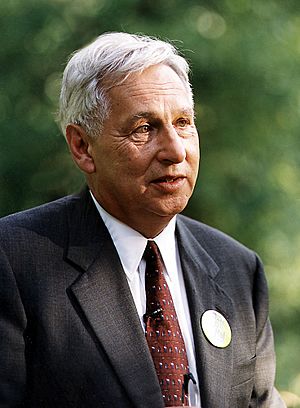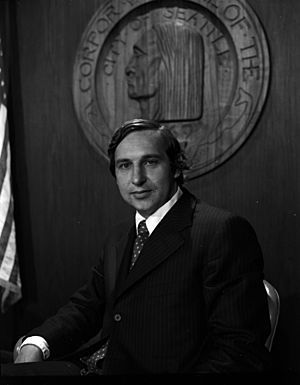Paul Schell facts for kids
Quick facts for kids
Paul E. S. Schell
|
|
|---|---|
 |
|
| 50th Mayor of Seattle | |
| In office January 1, 1998 – January 1, 2002 |
|
| Preceded by | Norm Rice |
| Succeeded by | Greg Nickels |
| Personal details | |
| Born |
Paul Schlachtenhaufen
October 8, 1937 Pomeroy, Iowa, U.S. |
| Died | July 27, 2014 (aged 76) Seattle, Washington, U.S. |
| Nationality | American |
| Political party | Democratic |
| Alma mater | University of Iowa Columbia Law School |
| Profession | lawyer, urban planner, real estate developer |
Paul E. S. Schell (born Paul Ervin Schlachtenhaufen; October 8, 1937 – July 27, 2014) was an American lawyer and politician. He served as the 50th Mayor of Seattle, Washington, from 1998 to 2002.
Contents
Early Life and Education
Paul Schell was the oldest of six children. His father was a Lutheran minister, and his mother was a nurse. He grew up in a small farm town called Pomeroy, Iowa. He graduated from Roosevelt High School in Des Moines, Iowa.
Paul first attended Wartburg College in Waverly, Iowa. There, he played linebacker on the school's football team. He also worked as a short-order cook and a fireman. Later, he transferred to the University of Iowa and finished his degree.
After college, he went to law school at Columbia University in New York. He met Pam, a registered nurse, who would become his wife. They got married on the day he graduated from law school. This was a special double celebration for his family.
Career Highlights
In New York, Paul Schell worked at a law firm called Dewey Ballantine. He focused on corporate finance, which involves managing money for large companies. During this time, he shortened his last name from "Schlachtenhaufen" to "Schell." He said this change was practical because his longer name did not fit on computer cards used back then. He also worked as a summer law clerk in Portland.
In 1967, Paul and Pam Schell moved to Seattle. Paul started working at the Perkins Coie law firm. He practiced business and securities law, which deals with company rules and investments. Their daughter, Jamie, was born in 1971.
After a few years, Schell left Perkins Coie to help start a new law firm. It was called Hillis, Schell, Phillips, Cairncross, Clark and Martin.
Civic Involvement
Paul Schell was also very active in his community. He joined other city activists with Allied Arts of Seattle. In 1971, they worked to save the Pike Place Market. There was a plan to rebuild the market, but they wanted to preserve it.
In 1973, Schell left his law practice to work in public service. Mayor Wes Uhlman appointed him as director of the Seattle Department of Community Development. In this role, Schell helped save and rebuild the Pike Place Market.
As President of Allied Arts of Seattle, he led a successful effort in 1973. This effort established "One Percent for Art." Seattle became one of the first cities to set aside one percent of its construction budget for public art. This idea later became a standard for cities across the country.
Schell was a member of the Democratic Party. He first ran for mayor in 1977 but lost the election to Charles Royer.
Real Estate and Port Commissioner
In 1979, he started Cornerstone Development Company. He was its president from 1979 to 1987. His company developed projects in Seattle, Tacoma, and Portland. One major project was Waterfront Place in Seattle. This project included restored buildings, a new tower, and a hotel.
In 1989, Schell developed the Inn at Langley and later the Boatyard Inn on Whidbey Island. He also helped create the Whidbey Island Center for the Arts.
In 1989, Schell was elected as a Commissioner for the Port of Seattle. He became the commission president in 1995.
University and Mayoral Term
From 1993 to 1996, he served as Dean of the University of Washington College of Architecture and Urban Planning. During this time, he created the UW's Office of Sustainability. He also improved the Rome Studies Program. He supported new programs in real estate and environmental studies.
Schell was elected Mayor of Seattle and began his four-year term on January 1, 1998. As mayor, Seattle built a new City Hall and the Seattle Justice Center. Several libraries were also built, including the main downtown library. This was funded by a $196 million bond campaign called "Libraries for All."
He invested $200 million in new parks and added six new community centers. The Opera House and Seattle Symphony Hall were rebuilt. QWest Field was developed. He also helped pass 26 new neighborhood plans. These plans led to improvements funded by a $198 million levy for parks and the zoo.
Schell also championed a $72 million effort to renovate the Seattle Center Opera House and community centers. He started the development of the Olympic Sculpture Park. He helped with deals that led to the development of South Lake Union. Mayor Schell also helped design the new Seattle-Tacoma International Airport Traffic Control Tower.
The Schell family also supported Seattle's cultural life. They gave major support to the Intiman Theatre.
Challenges as Mayor
During his term, a large meeting called the WTO Meeting of 1999 took place. This meeting was met with large protests that gained national attention. The Seattle police chief, Norm Stamper, resigned after this event.
A Mardi Gras celebration in 2001 also saw some problems. A young man named Kris Kime was fatally injured. The police chief at the time, Gil Kerlikowske, ordered officers not to intervene. These events, along with Boeing moving its headquarters, affected Schell's re-election chances.
In the 2001 mayoral primary election, Schell came in third place. This was the first time in over 65 years that a Seattle mayor had not won the primary election. During the campaign, Schell was attacked by a political opponent. This person hit Schell in the face, breaking bones under his right eye. The attacker was later found guilty and sent to prison.
Despite these challenges, former Mayor Charles Royer praised Schell's term. In 2002, Royer said Schell was very smart. He believed Schell achieved a lot in his single term. Royer noted that Schell started the new City Hall complex and led efforts to build the downtown library. He also mentioned Schell's work on parks, the Opera House, and preserving the Cedar River watershed.
Death
Paul Schell passed away at the Swedish Medical Center in Seattle, Washington. He died on July 27, 2014, at the age of 76, after heart surgery.
Legacy
After Schell's death, Seattle Mayor Ed Murray shared a statement. He praised Schell's many years of community service.
Murray said Schell would be remembered as a great builder of Seattle. He worked as an activist, lawyer, city director, port commissioner, and mayor. He helped shape Seattle's public buildings and systems for over 40 years.
Schell's biggest achievements were the buildings and systems he helped create. He came up with the "Libraries for All" campaign. This led to a new downtown library and rebuilt branch libraries across the city. He also led the effort to fund Seattle's first parks levy. He helped rebuild the opera house and was key in building the Olympic Sculpture Park, Seattle's City Hall, and Justice Center.
As mayor, Schell helped develop Seattle's 37 neighborhood plans. These plans created the strong neighborhood system seen today. Schell cared not only about buildings but also about the people of Seattle. He worked hard to improve services for homeless and immigrant communities.
See also
- Timeline of Seattle, 1990s-2000s
 | Georgia Louise Harris Brown |
 | Julian Abele |
 | Norma Merrick Sklarek |
 | William Sidney Pittman |


